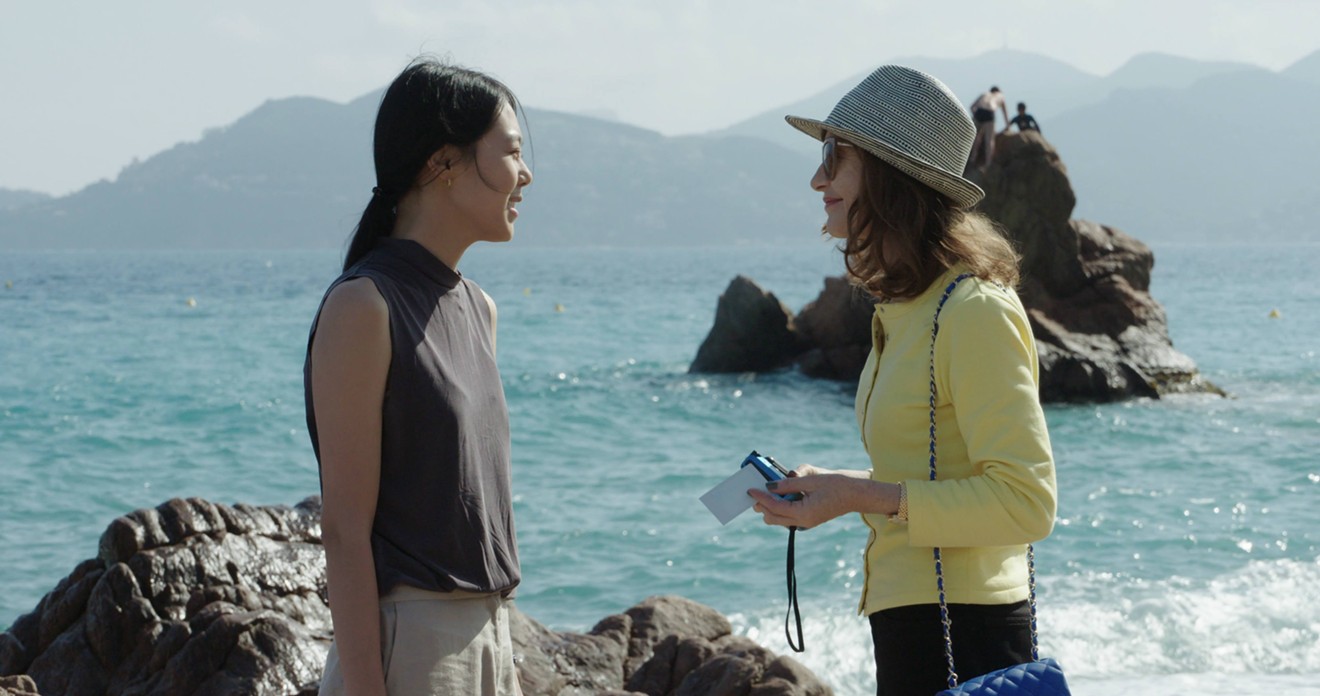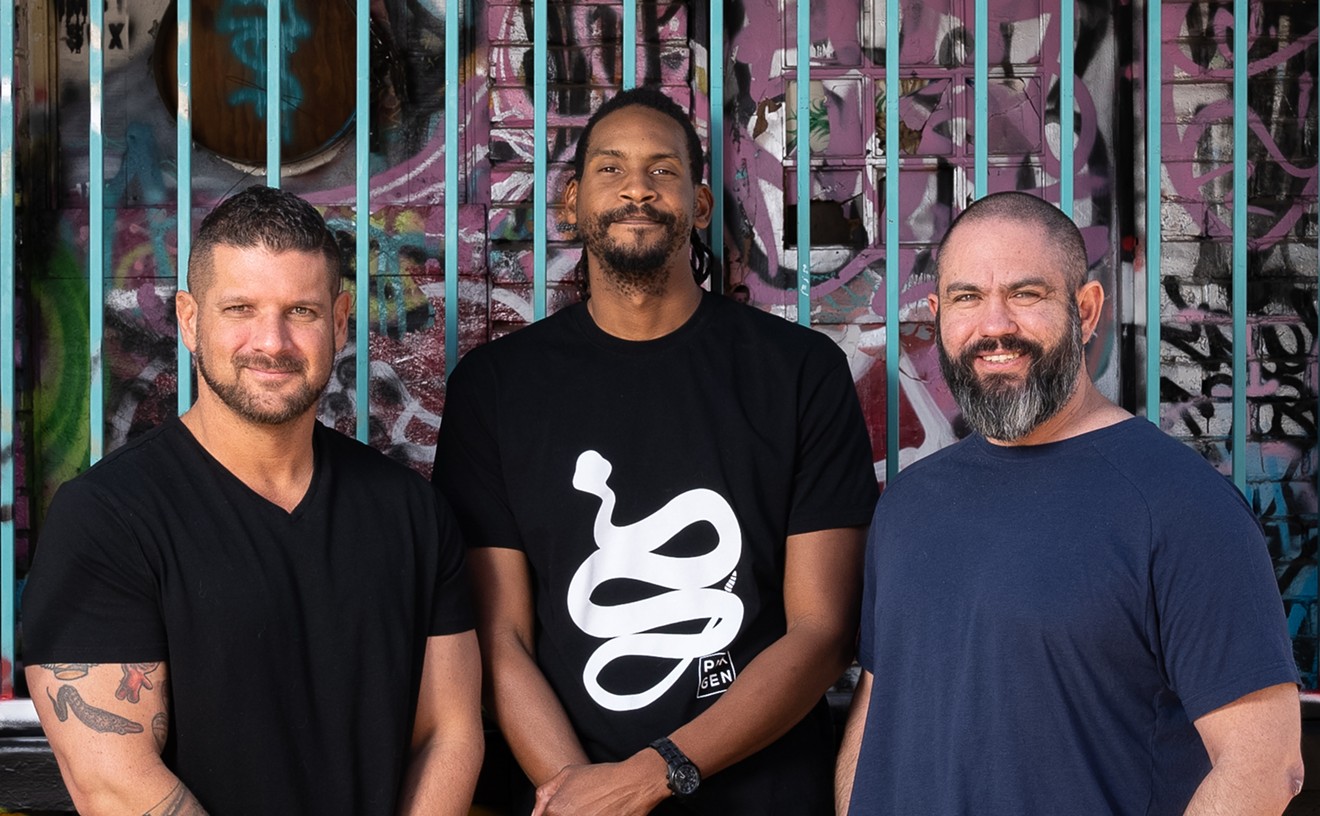Short and modest even by director Hong Sang-soo’s standards, the 69-minute Claire’s Camera unfolds as a whimsical little riff on trust, infidelity and the reality-altering magnetism of Isabelle Huppert. And yet, while it’s certainly the most effervescent of the three pictures the prolific Korean filmmaker premiered on the festival circuit in 2017 — the first was On the Beach at Night Alone, which opened theatrically in the U.S in November; then The Day After, coming to theaters this May — there are wells of real sadness and even anger in this film.
Set in Cannes (which, big surprise, is also where it premiered), Claire’s Camera opens with three scenes depicting the firing of a young woman, Man-hee (Kim Min-hee), from her job at a Korean film sales company. This is more narrative drama than Hong usually provides, but he makes sure to disorient us temporally. First, we see Man-hee at the office, as her boss Nam Yang-hye (Chang Mi-hee) asks if she’d like to take a break and get some coffee with her. As the two women leave, we jump a few days forward in time and see Man-hee telling a coworker about how she then proceeded to get fired by Nam; then we double back to see the dreadful coffee date itself. Each exchange unfolds in Hong’s typically understated but chatty style: a casual conversation, usually presented in a relatively wide two shot, taking in the characters’ subtle shifts in body language.
As usual, most of Hong’s film is built around such two- and three-person exchanges, and each conversation has a slightly off-balance dynamic. More often than not, one character tries their damnedest to be carefree — even funny — while the other wears a mask of gravity and concern. Ironically, it’s usually the person trying to make light of things who’s the one being hurt. When her boss grimly tells her she’s being let go, Man-hee plays it calm and cheery, even taking a selfie with the woman to mark the end of their long working relationship. Meanwhile, Nam couches her dismissal of Man-hee in the bullshit language of consensual separation. “Let’s stop working together … and if you don’t mind, let’s not wait until we get back to Seoul,” she tells her, as if they’re somehow equal partners in this exchange — conveniently ignoring the reality that by rendering Man-hee jobless in the middle of France, the older woman has left her mostly penniless and unable to return home to Korea. Hong has always been a master at capturing telling emotional details, but perhaps his real artistry lies in his ability to show how we cover up those details. His cinema is one of conveying that which is unseen and unheard but deeply felt.
Man-hee’s dismissal has been triggered by her brief affair with So Wan-soo (Jung Jin-young), an acclaimed Korean filmmaker whose latest film is screening at Cannes. The twist is that Nam has also been sleeping with So for years now, and considers Man-hee’s actions a betrayal. Never mind that Man-hee didn’t know about their involvement, and that the real betrayer here is So himself, who confesses that, like all good male Hong protagonists, he’s a mess when he’s drunk; alas, as a filmmaker on the verge of greater international recognition, he’s too important for Nam to get rid of so easily.
Into the picture walks Claire (played by guess who), a French high school teacher and amateur photographer on vacation in Cannes, who snaps the distraught Man-Hee's picture on the beach and then meets So at a local cafe. Unassuming to an almost hilarious degree, Claire has an uncanny ability to draw truths out of people and to take unguarded, surprisingly revealing portraits. She believes that the camera has the power to change things. “If I take a photo of you, you’re not the same person anymore,” she tells So. Later, she reiterates the point to Man-hee: “The only way to change things is to look at everything really slowly.” What exactly she means by any of this is left tantalizingly unclear.
Even though Claire’s Camera consists of seemingly simple, unfussy exchanges between the same three characters in different arrangements — Claire with So; Claire with Man-hee; Claire with So and Nam; Man-hee with So; and so on — what emerges eventually is not so direct: a playful meditation on the transformative nature of art. Bound to a schedule of premieres and various demands on his time, So — who bears more than a passing resemblance to director Hong himself, he of the Cannes premieres and the much-publicized affair with his actress Kim Min-hee — has been sucked into a world of expectation, transaction and incipient celebrity. Late in the film, So stands on a balcony, uncomfortable and awkward in a tuxedo (mandatory dress for evening galas at Cannes) and chastises Man-hee for wearing jean shorts. “No matter how people see you, just live as yourself,” he barks at her, but it’s hard not to think that he’s secretly telling himself off.
Meanwhile, Claire, the amateur free spirit, can float around and snap images of whatever she likes. And the film suggests — in its own unadorned, unassuming way — that there is a kind of magic in her camera, that through her anonymous yet personal art she is still able to change the very nature of reality. Does she possess a power that Hong Sang-soo, the internationally acclaimed artist who now does the film festival circuit year-round with his work, fear he may be on the verge of losing? For all its airy lightness and apparent simplicity, it’s hard not to watch Claire’s Camera and sense beneath its placid surfaces the fretful voice of a filmmaker who longs to return to the elements of his art.
[
{
"name": "Air - MediumRectangle - Inline Content - Mobile Display Size",
"component": "18478561",
"insertPoint": "2",
"requiredCountToDisplay": "2"
},{
"name": "Editor Picks",
"component": "16759093",
"insertPoint": "4",
"requiredCountToDisplay": "1"
},{
"name": "Inline Links",
"component": "17980324",
"insertPoint": "8th",
"startingPoint": 8,
"requiredCountToDisplay": "7",
"maxInsertions": 25
},{
"name": "Air - MediumRectangle - Combo - Inline Content",
"component": "16759092",
"insertPoint": "8th",
"startingPoint": 8,
"requiredCountToDisplay": "7",
"maxInsertions": 25
},{
"name": "Inline Links",
"component": "17980324",
"insertPoint": "8th",
"startingPoint": 12,
"requiredCountToDisplay": "11",
"maxInsertions": 24
},{
"name": "Air - Leaderboard Tower - Combo - Inline Content",
"component": "16759094",
"insertPoint": "8th",
"startingPoint": 12,
"requiredCountToDisplay": "11",
"maxInsertions": 24
}
]











